rid-, ridi-, risi-
(Latin: to laugh, laugh at; capable of exciting laughter; laughing)
deride (verb), derides; derided; deriding
1. To write or to talk about another person, or something, in a very critical or insulting way: Politicians often attempt to win votes by deriding their opponents.
2. To say that someone or something is of no value or is ridiculous: A newspaper critic derided David's book as dull and worthless.
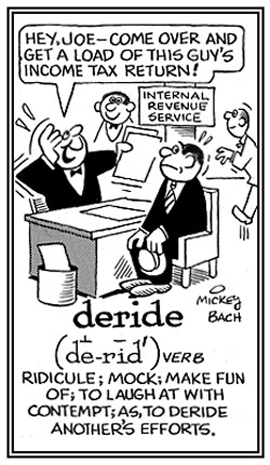
© ALL rights are reserved.
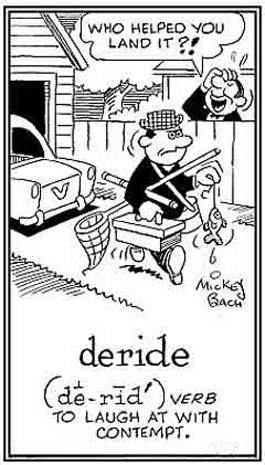
© ALL rights are reserved.
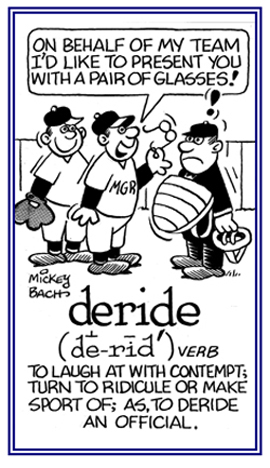
© ALL rights are reserved.
Go to this Word A Day Revisited Index
2. To say that someone or something is of no value or is ridiculous: A newspaper critic derided David's book as dull and worthless.



Go to this Word A Day Revisited Index
for a list of additional Mickey Bach illustrations.
deridingly (adverb), more deridingly, most deridingly
The state or act of being ridiculed or mocked with sarcasm or disrespect: There was a lot of derision and sneering going on when the teacher entered the classroom and found out that the new boy was the object of all of the laughter.
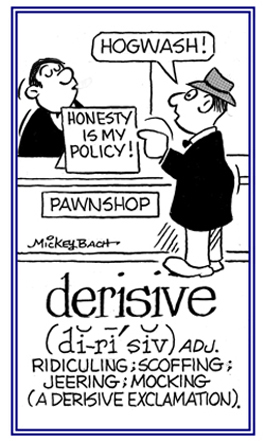
© ALL rights are reserved.
Go to this Word A Day Revisited Index
This cartoon provides an example of what the term derision is expressing.

Go to this Word A Day Revisited Index
so you can see more of Mickey Bach's cartoons.
derisive (adjective), more derisive, most derisive
A reference to the action of mocking or ridiculing someone or something: The losing high school football players received a great deal of derisive comments, jeering, and rude remarks, from their fellow students.
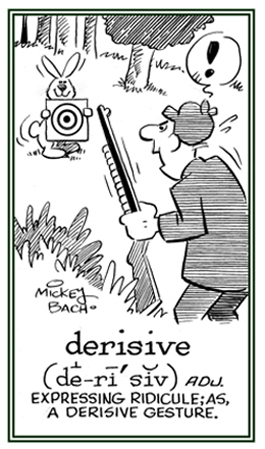
© ALL rights are reserved.
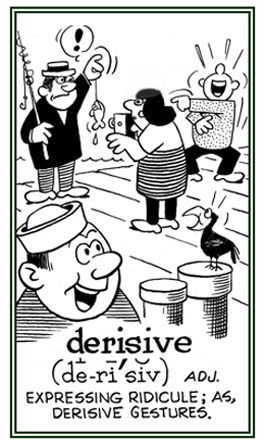
© ALL rights are reserved.
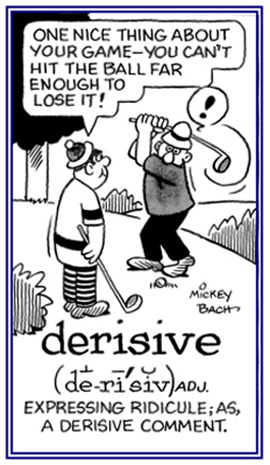
© ALL rights are reserved.

© ALL rights are reserved.
Go to this Word A Day Revisited Index




Go to this Word A Day Revisited Index
so you can see more of Mickey Bach's cartoons.
derisively (adverb), more derisively, most derisively
riant (adjective), more riant, most riant
1. Pertaining to hilarity or cheerfulness when something is amusing: The riant audience responded to the comedian's presentations with a great deal of laughter.
2. Etymology: from French rire, "laugh."
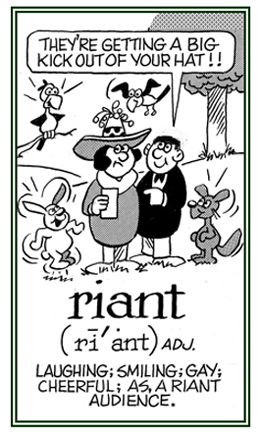
© ALL rights are reserved.
Go to this Word A Day Revisited Index
2. Etymology: from French rire, "laugh."

Go to this Word A Day Revisited Index
so you can see more of Mickey Bach's cartoons.
riantly (adverb), more riantly, most riantly
ridicule (verb), ridicules; ridiculed; ridiculing
1. To laugh at or to make jokes about someone or something in an unkind way: The other kids at school were ridiculing Janet because she was dressed more like a boy than a girl.
2. Etymology: from Latin ridicule, "to laugh, to joke."
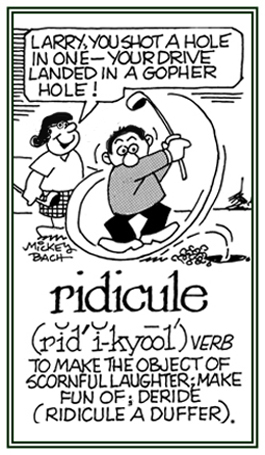
© ALL rights are reserved.
Go to this Word A Day Revisited Index
2. Etymology: from Latin ridicule, "to laugh, to joke."

Go to this Word A Day Revisited Index
so you can see more of Mickey Bach's cartoons.
ridiculous (adjective), more ridiculous, most ridiculous
1. Descriptive of someone or something that is not being sensible or reasonable: Daniel makes a ridiculous amount of money for the kind of work that he is doing.
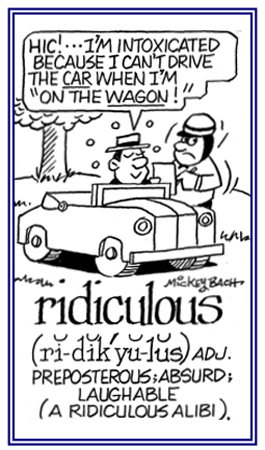
© ALL rights are reserved.
Go to this Word A Day Revisited Index
Sharon looks silly in that ridiculous outfit that she is wearing to school.
2. Etymology: from Latin ridiculosus, "laughable"; from ridere, "to laugh."
Go to this Word A Day Revisited Index
so you can see more of Mickey Bach's cartoons.
ridiculously (adverb), more ridiculously, most ridiculously
1. A tendency to laugh at someone or something: When James was at school, students expressed their risibilities at the way he was dressed just like a girl.
2. Etymology: from Latin risibilis, "laughable", from ridere, "to laugh."
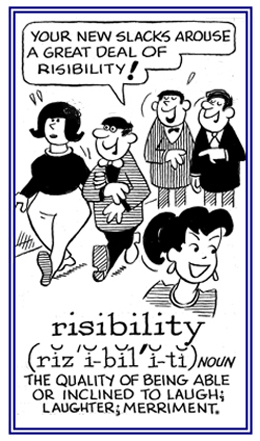
© ALL rights are reserved.
Go to this Word A Day Revisited Index
2. Etymology: from Latin risibilis, "laughable", from ridere, "to laugh."

Go to this Word A Day Revisited Index
so you can see more of Mickey Bach's cartoons.
Showing page 1 out of 2 pages of 18 main-word entries or main-word-entry groups.

